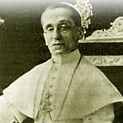Regina Caeli – Queen of Heaven, Rejoice!
The Regina Caeli, Latin for “Queen of Heaven,” is a hymn and prayer ...

Giacomo della Chiesa was born in Pegli, Italy, in 1854, the son of a Italian noble family. After becoming a priest in 1878, he was called into Vatican diplomatic service and was named Papal Nuncio to Spain. He was later called back to the Vatican to assume the post of privy chamberlain, then secretary of state in 1901. In 1907, Pope Piux X appointed him Archbishop of Bologna then, in 1914, Cardinal. Upon the death the Pope St. Pius X a few months later, he was elected and took the name Benedict XV. Given that he was elected in 1914 immediately after the outbreak of World War I and that he died only 4 years after its conclusion, his pontificate in large part was colored by the difficult task of pastoring a world and Church torn asunder by the greatest armed conflict that had ever occurred up to that time. Pope Benedict, of course, maintained a position of strict neutrality throughout this “war to end all wars.” His protests against the use of poison gas displeased both sides. He sent a representative to each country to work for peace, and in 1917 delivered the Plea for Peace, which demanded a cessation of hostilities, a reduction of armaments, a guaranteed freedom of the seas, and international arbitration. The American President Woodrow Wilson was the only ruler who answered him, declaring peace impossible, though he afterwards adopted most of Benedict’s proposals for establishing peace as part of his 14 point peace plan. During and after the war, Benedict XV gave freely to the war’s victims–widows, orphans, and wounded–and established a bureau of communication for prisoners of war with their relatives. After the war he was widely honored for his efforts. Muslim Turkey erected a statue to him in Istanbul, honoring him as “the benefactor of all people, regardless of nation or creed.” As regards his legacy to the Church, Pope Benedict XV was the first to gather together all the various laws of the Church into a unified, comprehensive Code of Canon Law which was not revised until the time of Pope John Paul II. Benedict XV was also zealous in his work to foster unity among all Christians, particularly between the Catholic Church and the various Eastern Orthodox Churches. To that end he established a new department in the Vatican called the Congregation for the Oriental Church as well as founding the Pontifical Oriental Institute of Studies and the Coptic College, both in Rome. He also enlarged the foreign mission field, and, in his first Encyclical, condemned errors in modern philosophical systems. His encyclical Spiritus Paraclitus is particularly notable for its encouragement of Catholic Biblical Studies, extolling St. Jerome as the great model of truly Catholic Scripture Scholarship who rigorously employs all the scientific tools available while approaching the text of the Bible prayerfully, remembering that it is indeed the inspired word of God. This holy successor of St. Peter died in 1922 and was succeeded by Pope Pius XI. Biography by Dr. Italy